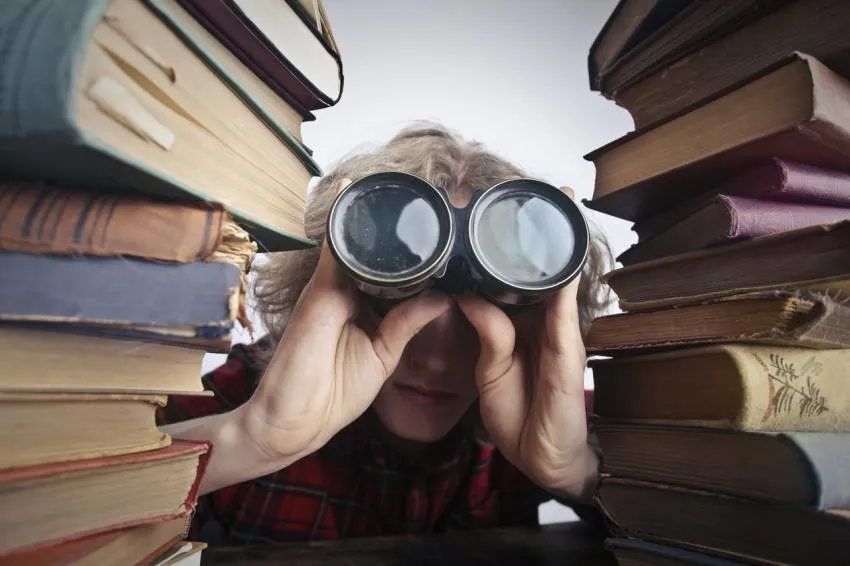Why Observation And Detachment Are Important For A Clear View Of Your Reality
Reality is a concept that has been debated continuously throughout time. Simply put reality is defined by the Cambridge dictionary as the state of things as they are rather than as they are imagined to be.
This perceiving of the state of things as they are, the reality, can come from a single individual or a group of people. This is why we have so many communities and people on Earth that have different experiences and realities.
We have billions of people on this Earth and every single one is experiencing their own reality, even if it's not similar to your own.
It often happens, though, that our reality or our view of our reality can sometimes be skewed. This can happen due to many things from set beliefs, trauma, love, fear, our own imagination, and so on.
In order not to get trapped in a lie or fantasy, we have to find a clear view of our realities. But, what is it and how do I get it?

What is a clear view of your reality?
I define having a clear view of your reality as being aware and noticing how things are without emotions, thoughts, assumptions, or expectations attached to it.
A clear view of your reality first involves having awareness of yourself. What are your wants and needs? What do you think about most? What are your beliefs? In what way do you perceive the world? What is the state of your mind, body, and soul?
Within that view of reality, acceptance also has to be involved. If it isn't your mind will try to make what is, into something that fits your narrative that is set up to protect yourself. Acceptance can be acknowledging that, even though you want to, you can't be in that relationship anymore or that you just don't like or tolerate certain things anymore.
Accepting things is hard but after you have accepted them you can look back and see them as what they truly were, or the reality of them. Which finally gives you the clear view that you were searching for.
Discernment is also essential in having a clear view of your reality. Think about this for a second. What if your thoughts and beliefs are actually yours and not society's or your family's?
But, knowing the truth about things is hard. I can already hear you say. What if I'm being lied to?
Well, what if you are being lied to? In such cases, you need to trust yourself to know what to do if or when the time comes. You have to trust your intuition and yourself to have your own back. This brings us to another important component of having a clear view of your reality, trust in yourself.
Know this, you can trust yourself, it's ok. You don't always have to outsource things to other people, a lot of the answers are within you. Trust your knowledge, trust yourself.
This all sounds great but in order to become aware of yourself and get a clear view of your reality, a few things need to happen. One of them is observation and the other is healthy detachment.

Observing yourself and your surroundings
Now, observing your surroundings is more than just looking around you when you go for a walk to make sure you are safe, but we will get into that later.
Before observing your surroundings, it is better if you start by observing yourself. What do I mean by observing yourself? Look at your thoughts, look at your patterns, your rituals, how you interact with certain people and situations. Ask yourself why you do what you do or think what you think.
Observing yourself will help you identify certain things you hadn't noticed before, for example, the reasons you do certain things that don't have validity anymore because those reasons don't exist in your reality anymore. So, what you're doing, you don't have to do it, or at least not in the same way.
It could be that you're used to cleaning on Saturday morning because your parents made you but you have your own place now and don't need to heed those orders anymore. Or you have the tendency to wake up with anxiety or stress due to a job but you finally left that job so there's no need to feel anxiety anymore.
By observing yourself and your patterns, you get the opportunity to identify certain areas that need healing and that you can now concentrate on bettering.
Of course, a lot of our growth comes from interactions with others. So, as you observe yourself, also observe others and certain situations.
How do you react to others? How do others react to you? Why is that? Can you see a way to change a situation from negative to positive? How can you interact better?
Sometimes the best thing to do is to let go of a person or situation. But, in order to do that, you have to first observe as well as record your observations and your feelings. After all, we are emotional beings even if we try to be logical most of the time.
So, being emotional beings we need healthy ways to express these emotions.
A few ways to record your feelings in order to look back at them later are voice recording, video recording, and journaling. This can also turn into shadow work, remember that not all of your shadows are negative aspects of yourself.
When looking back on your experiences it is best if you do it with a healthy those of detachment. What is that?

Healthy Detachment to calmly analyze a situation
First of all, we have to define attachment. In psychology, attachment is defined as a deep and enduring emotional bond between two people.
Detachment, on the other hand, is the opposite of attachment and it means to be aloof, distant, or standoffish. In essence, you do not have a deep emotional bond with someone.
Falling too far on either being attached or detached can cause mental and emotional distress, eventually turning into a mental illness. But, if done well it can help you.
Healthily detachment does not mean you have to suppress your feelings or not feel anything at all. It means that you feel your emotions, let them go, and go into a calm, maybe even peaceful state in order to look at what is in front of you.
Let's say that you have a pet, and this pet was operated. It now has stitches and your vet tells you to get the pet a cone so that it doesn't take out the stitches and hurt itself. You are a very anxious person and you do everything in your power to make sure your pet doesn't tear the stitches.
Even arguing with your family whenever they take the pet's cone off because they feel sorry for the pet having to wear that. The fighting puts more stress on you and more anxiety.
One day, a few days before going to the vet to get the stitches removed, you have to go out and leave the pet with your family. When you come back you notice that your pet has pulled out a stitch. You freak out and start thinking about all the things that the vet will say and how they will scold you when they find out.
You keep thinking about this in the days to come building up your anxiety. You begin to feel a sharp pain and a heaviness in your chest. The night before you can't take it anymore and decide to do some breathing exercises, as well as stop thinking about what's to come. You detach.
You get to that peaceful state, let all the anxiety and stress go. On the day of the vet, you drive without thinking about anything in particular. You get to the vet and wait for the technician to do her job. When she comes back she smiles and says that the wound looks so good and it has cicatrized well.
You are shocked and realize that focusing too much on a certain outcome and giving it so much energy was a waste of time. Because the reality of it was completely different. And you see that now.
This is an unusual example to depict healthy detachment but it can also apply to other types of relationships. For example, having the strength to detach emotionally from an abusive relationship in order to get out of a certain dream or outcome that is truly bringing you down but you can't see it because you are too attached.
Healthily detaching in certain moments can help prevent fights, arguments, accidents, wasting excessive energy and resources, and so on. Remember it does not mean that you stop feeling or suppress your emotions.
It just means that for a moment in time, you let it all fall away so you can see the reality in front of you. Not twisted by your wants, emotions, hopes, and desires; or anyone else's for that matter.
It gives you the clarity and ability to act in a different way to the past and actually get something resolved or done.
If you ever feel overcome with emotion, while it may be warranted, take a few deep breaths. You can see a more effective solution better in calmer waters.
Opinions and Perspectives
This approach has helped me make better decisions by seeing situations more objectively.
Sometimes I catch myself creating stories about situations instead of seeing them as they really are.
The concept of accepting reality as it is rather than how we want it to be is powerful but challenging.
Ive noticed my anxiety decreasing since I started practicing some of these observation techniques.
The section about discernment really stood out. We need to question if our beliefs are truly our own.
Starting to see how my own beliefs have limited my perception of whats possible in my life.
Its fascinating how our reality can be so different from someone elses even when experiencing the same event.
The article made me realize how much energy I waste worrying about things that never happen.
Finding that sweet spot between attachment and detachment is an ongoing challenge for me.
I wonder how different the world would be if everyone practiced these principles of clear observation.
Been practicing observation without judgment lately and its surprising how much it reveals about myself.
The example about pet anxiety really shows how we can create our own stress by imagining worst-case scenarios.
Interesting how the article connects awareness with acceptance. You cant really have one without the other.
The part about recording observations is practical advice I hadn't considered before. Might start doing that.
Learning to trust myself has been a journey. Still working on it but articles like this help validate the process.
I feel like social media makes it even harder to maintain a clear view of reality these days.
Never thought about how cleaning on Saturdays was just a carried-over habit. Made me question other automatic behaviors.
Shadow work mentioned in the article is so important. Understanding our darker aspects helps us see reality more clearly.
The article could have gone deeper into how childhood experiences shape our current reality perception.
Im still struggling with the balance between feeling emotions fully and maintaining healthy detachment. Any advice?
This approach has helped me tremendously in my relationships. Taking a step back before reacting makes such a difference.
The hardest part for me is letting go of expectations. They really do color everything we see.
I find it fascinating how our beliefs can create such different realities. Makes me wonder how much of what I believe is actually true.
Breathing exercises have been a game changer for me in practicing healthy detachment. They really help create that mental space.
Just started practicing some of these techniques and already notice a difference in how I handle stressful situations.
The concept of reality being different for everyone makes me question my own perspective more often now.
Love how the article addresses trust in oneself. We often doubt our intuition when we should be listening to it more.
True observation without judgment is harder than it sounds. I catch myself making assumptions all the time.
Does anyone else find it easier to observe others patterns than their own? I feel like Im blind to my own behaviors sometimes.
The distinction between healthy detachment and emotional suppression was really helpful. I used to think they were the same thing.
Sometimes I wonder if complete objectivity is even possible. Aren't we always viewing reality through some kind of lens?
Journaling has been incredibly helpful for me in observing my patterns. Looking back at old entries often reveals things I never noticed in the moment.
The article makes a good point about accepting things as they are. I spent years trying to force situations to match my expectations.
Im curious about how others practice healthy detachment in their daily lives. Any practical tips that work for you?
This reminds me of mindfulness practices. Being present without judgment is similar to observing reality clearly.
I actually disagree with some points. Sometimes our emotional responses are valid and necessary for survival. We shouldn't always try to detach.
The section about observing patterns in our behavior was eye-opening. I never realized how many of my habits are just inherited from my parents.
Anyone else find it ironic that we need to detach to see things more clearly, yet our emotions are what make us human? I struggle with finding that balance.
What I find interesting is how different people can experience the same situation yet have completely different realities. Makes you think about perspective.
The part about trusting yourself really resonated with me. I often find myself seeking validation from others when I probably already know the answer.
I appreciate how the article emphasizes that healthy detachment isn't about suppressing emotions. That's a common misconception I used to have.
The pet surgery example really hit home for me. I had a similar experience with my cat last year and definitely could have handled my anxiety better.
Totally agree with you. The hardest part for me is recognizing when I'm too emotionally invested to see things clearly.
I understand the concept but honestly find it quite challenging to detach from emotions in difficult situations. Anyone else struggle with this?
I found this article fascinating, especially the part about how our reality can be skewed by our emotions and past experiences. It really made me think about how I view certain situations in my life.
